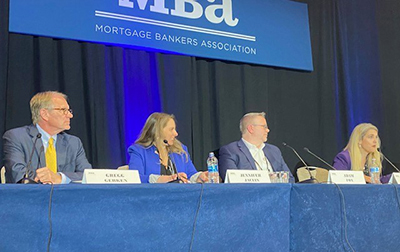
#MBACREF23: ESG in CRE ‘Doing Better, Tracking Better’

(l-r.: Gregg Gerken, Jennifer Jaclin, Adam Fox, DeAnne Reed)
SAN DIEGO–A recent Bloomberg article reported ESG (Environmental, Social and Governance) investment assets under management could grow to $52 trillion by 2025. But what exactly is ESG?
“It’s a simple question, but the answer can be powerful: ESG means doing better and tracking better,” said DeAnne Reed, Assistant Vice President, Servicing Operations, Pacific Life Insurance Co., Newport Beach, Calif., here at the Mortgage Bankers Association’s Commercial Real Estate Finance/Multifamily Housing Convention & Expo.
Jennifer Jaclin, Vice President and Portfolio Manager with MetLife Investment Management, New York, said ESG “means doing better for the world. It overlays into everything in commercial real estate,” she said. “You need to know who you’re dealing with and what their track record is.”
Gregg Gerken, Executive Vice President of TD Bank Group & Head of U.S. Commercial Real Estate with TD Bank N.A. and TD Bank Commercial, Toronto, said many investors now say they want to make sustainable investments. “They are looking for good, sound long-term investments in an area not subject to rising seas or big climate events like we have seen recently,” he said. “When you look at how ESG has developed in a short time, this framework about this idea of just doing good has come to doing things that are smart. That’s what I see as biggest change in last few years. And that’s just the ‘E’ in ESG. I haven’t even gotten into the ‘S’ or the ‘G’ yet.”
Adam Fox, Senior Director in Fitch Ratings’ U.S. commercial mortgage-backed securities group, said from a rating agency perspective ESG is a “prime focus” that is driving investors in the market. But it is still evolving from a credit perspective, he noted.
Fox said potential regulatory changes will be important to watch. “Look at environmental regulations; you’ve got different regulations in 24 states about emissions,” he said. “For example, New York City Local Law 97 will cap building emissions. What you don’t want is a building to end up in default because it needs to redo its HVAC system. So regulatory changes are a big challenge.”
Jaclin noted more talk about ESG at the governmental level and new regulations from the market overall. “At the corporate level, there are more corporate mandates about ESG. Investors are also more interested.” She said many real estate operators, lenders and investors are trying to figure out how to approach ESG, “but now we are working together to figure out how to operationalize this across the industry.”
Reed suggested interested MBA members check out the MBA Green Lending Roundtable. “There have been nice things coming out of that from an alignment perspective,” she said. “We can better move this process forward by having unified discussions.”
